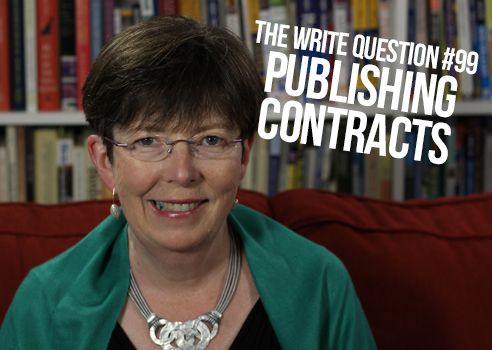Viewing time: 4 mins. 52 secs.
The Write Question is a weekly video podcast about writing that I started in 2017 and that ran, more or less weekly, until April 2022. This is a republication of issue #99, which addresses how to evaluate a publishing contract. The post first ran on July 12/19.
Transcript:
Welcome to The Write Question, I’m Daphne Gray-Grant and my topic today is how to evaluate a publishing contract.
I have a question from Lisa Rumple — a writer based in Vancouver. Here’s what she’s asked:
“I’m considering signing a contract with a publishing company and I don’t know how to evaluate what they are offering. Can you give me any advice?”
Thanks for your question, Lisa. As you know, after receiving your email, I contacted you and asked to see a copy of the contract. It represents a new trend in book publishing and I’d like to warn all authors about it.
The nature of book publishing has changed dramatically in the last 20 years. Three issues have driven this change:
- The existence of the Internet
- The rise of Amazon.com, and
- Print-on-demand publishing
Of course, you’ll be familiar with the first two points, but you may not have thought of the third. Print-on-demand publishing allows printers to do very small pressruns – somewhere between five and 10 copies.
In previous generations, the cost of setting up the presses was so extreme that you had to print at least a thousand books before the costs made any sense. Now, however, printers can do exceptionally small press-runs and this means that authors or publishing companies don’t have to make a big investment up front. Amazon.com also acts as a publisher and its books are mostly printed on demand, which is what makes their entire system feasible.
So, as a result of these major behind the scenes changes, another type of publishing empire has sprung up. Sometimes, this empire is called hybrid publishing. But other terms are also used and these include partnership-publishing, author-assisted publishing and entrepreneurial-publishing. I’m including a link below to an article from writer’s digest that summarizes many aspects of the hybrid publishing model.
Basically, this model calls on you to pay some of the costs associated with publishing. In your case Lisa, I can see they want you to pay $6,000. The concern I have is that your contract doesn’t really make it clear what kind of royalty you’re going to be paid. Basically, royalties for traditional publishing are in the less-than-10% range. If you’re paying for part of the publishing upfront, your “partner” should be paying you more than 10% and your contract needs to specify exactly how much more that royalty is going to be.
I’ve also noticed in your contract that the services they ARE offering you seem very limited. They say they will give you structural or substantive editing — which is good — but the specify they will NOT provide copy editing, which is bad.
They say they are going to provide you with layout services and a cover design but they don’t mention how tailored this will be to your book. Finally, they say they will offer marketing support, but what they are suggesting looks very generic to me – they’ll offer CRITIQUES of whatever it is YOU are going to do.
Lisa, part of the reason I don’t like hybrid publishing is that you, the author, lose control over who does the work for you and yet you get almost none of the benefits of a traditional publishing arrangement.
As a self-published author myself, I hire my own editor and cover designer and layout artist. The total of that will probably cost me more than $6,000 but not much more and I have total control. I also make 100% of what I sell, not a royalty.
If you have some smarts and some determination and $6,000 to spend on publishing, then spend it yourself. You don’t need a hybrid publisher to help you.
Finally, let me wrap up with a quote from the great American writer Anne Lamott, author of Bird by Bird, link below: “Publication is not all it is cracked up to be. But writing is. Writing has so much to give, so much to teach, so many surprises…. The act of writing turns out to be its own reward.”
Lisa, many people seem to believe that they will become writers only by being published. That is not true. You are a writer when you write. If you want to become published, there are several ways to achieve that end. I encourage you to think beyond hybrid publishing.
Links
Bird by Bird by Anne Lamott


